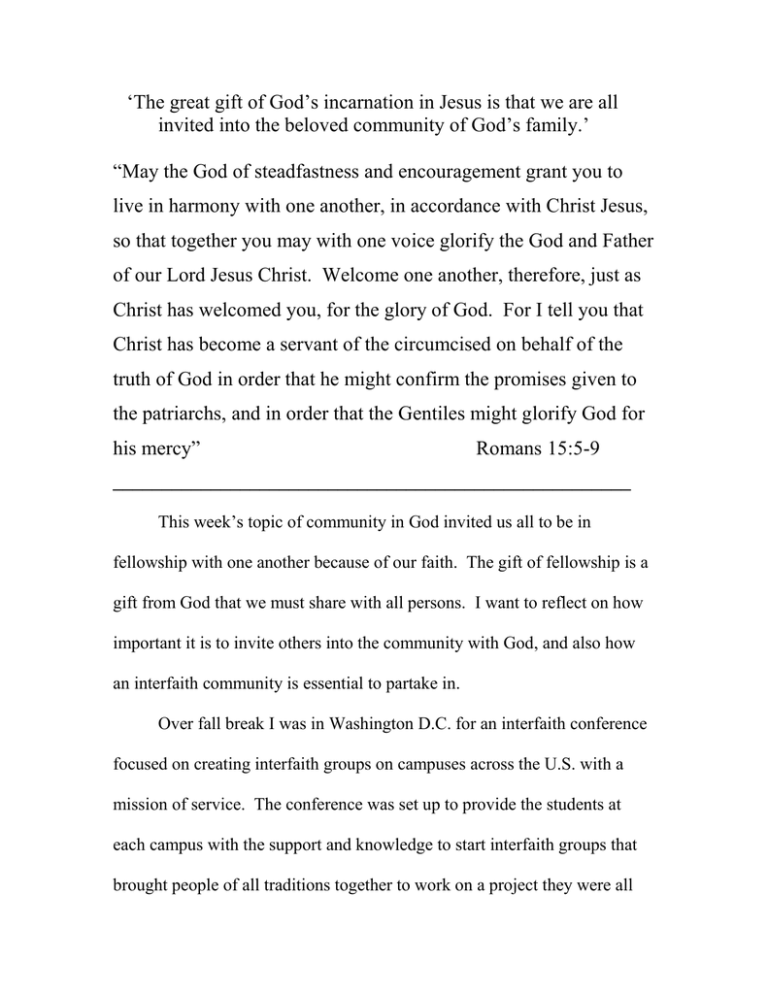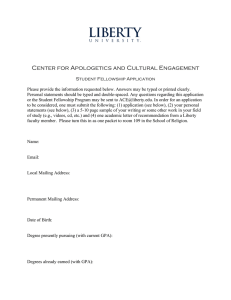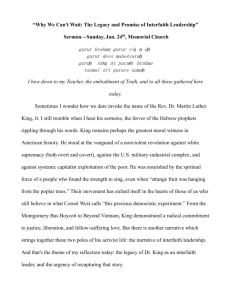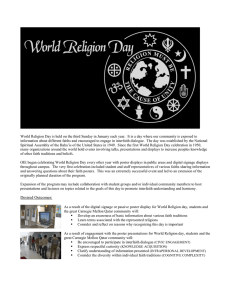‘The great gift of God’s incarnation in Jesus is that... invited into the beloved community of God’s family.’
advertisement

‘The great gift of God’s incarnation in Jesus is that we are all invited into the beloved community of God’s family.’ “May the God of steadfastness and encouragement grant you to live in harmony with one another, in accordance with Christ Jesus, so that together you may with one voice glorify the God and Father of our Lord Jesus Christ. Welcome one another, therefore, just as Christ has welcomed you, for the glory of God. For I tell you that Christ has become a servant of the circumcised on behalf of the truth of God in order that he might confirm the promises given to the patriarchs, and in order that the Gentiles might glorify God for his mercy” Romans 15:5-9 _____________________________________________________ This week’s topic of community in God invited us all to be in fellowship with one another because of our faith. The gift of fellowship is a gift from God that we must share with all persons. I want to reflect on how important it is to invite others into the community with God, and also how an interfaith community is essential to partake in. Over fall break I was in Washington D.C. for an interfaith conference focused on creating interfaith groups on campuses across the U.S. with a mission of service. The conference was set up to provide the students at each campus with the support and knowledge to start interfaith groups that brought people of all traditions together to work on a project they were all passionate about. More importantly though was after the project, the students would reflect and share with each other about why community service is important to them in pertaining to their faith or tradition. While I learned a lot of the training sessions at the conference, the conversations I had with other students were the most beneficial. I want to tell you a story I heard from my friend Grant, a student from the Univ. of Rochester at the conference. Grant is a Chinese-American student and has an interesting story of becoming Christian. It is very common in China to be apathetic to religion until one is retired and has time for such things, which is the case for Grant’s family. He moved to the U.S. when he was 6 after living in China and Japan. In his neighborhood community, some Christians saw the need to reach out to the large population of Chinese youth and teach them about God by forming a youth group. Grant joined the youth group and was brought into a specific Christian community with these people. He was taught about the love and power of God, but he was also taught about the homosexual agenda from a negative viewpoint. The youth group went on walks through the town to cast out demons from buildings; and the most striking thing to him at age 13 was that the leader said Pokémon were demons. As a young kid in the 1990s, who lived in China and Japan before coming to the U.S., Pokémon were very popular, and being told that Pokémon were unchristian turned him away from this youth group and the teachings they were instilling. The demonic teachings of Pokémon were the turning point for him, and he also realized that most of the other teachings didn’t fit with his beliefs either. I think the easy thing for him to do would have been to reject Christianity and rejoin his Atheist family in their beliefs. But, through this initial community with God that he was invited to, Grant learned of God’s greatness and sought out a different youth group that taught him to love everyone, they didn’t cast out demons, and where he could still play Pokémon. An initial invitation to take part in a religious community brought Grant into God’s community from then on. I am still so impressed with how he dealt with reconciling his first Christian experience and how he chose to remain in community with God. What I have learned from this, and I hope that we can all do in our lives is realize how important it is to invite people into our community because it will glorify God and unite us in fellowship. The people we reach out to should not just be other Christians, but people like Grant who didn’t have a faith until after joining in fellowship, or members of other religions, and people who don’t believe in God. Reaching out to people who don’t already have a faith or have different religious beliefs than us is just as important in forming community. An interfaith community encompasses more than just our need to share the good News, it extends its arms to welcome everyone, it provides a group that will work together for the greater good, and it fulfills our desire to be in a mutual fellowship where faith and tradition are rooted strongly, but the traditions also can vary. I learned what it means to be in an interfaith community is while at the conference because the community I was in was not just Christian, but Buddhist, Hindu, Jewish, Muslim, and Atheist among many more traditions. This diverse group of students formed an energetic community that wants to do good because we were all passionate about how our faith or philosophical tradition calls us to serve others in need. From our common passion of social justice, I saw the importance of working together in an interfaith community to welcome all people to be in a harmonious fellowship with one another. I believe that we are all called by God through Jesus Christ to be in fellowship with God, and also with God’s people; we are to love and care for them and show respect to all. Interfaith communities bring many different faiths together, but we can remain strong in our faith and also be sensitive towards others as we fulfill our calling to love our neighbor.






